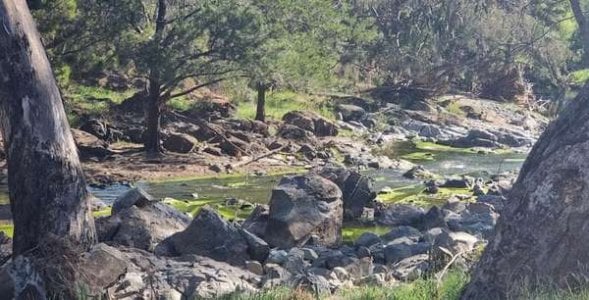Experts warn about dangerous amounts of toxic material in famous campsite
By
Danielle F.
- Replies 5
Australia's great outdoors is a treasure trove for campers, with its stunning landscapes and abundant wildlife.
However, an alarming discovery at a popular camping site could put the health of outdoor enthusiasts at risk.
The picturesque Bakers Shaft Reserve has been contaminated with toxic chemicals that could have severe implications for visitors.
The chemicals are known as perfluorooctane sulfonate (PFOS)—part of a group of substances referred to as 'forever chemicals'.
PFOS is heavily used in various industries for its water and flame-resistant properties.
However, these chemicals are resistant to breaking down, making them dangerous for both humans and nature.
University of Western Sydney's Associate Professor and water expert Ian Wright raised the alarm about the amount of 'forever plastics' on the site.
This news should be a concern for the tourists who flock the Bakers Shaft Reserve for fishing, swimming, and camping.
The NSW Environment Protection Authority (EPA) conducted tests in the area.
The results showed PFOS levels above ecological guidelines.
However, they claimed the levels are below the current guidelines for drinking and recreational water quality.
'The presence of PFOS in the environment does not necessarily mean there is a risk to human health. However, identifying sites that need investigating is an important precaution to reduce the risk of community exposure to PFOS,' an EPA spokesperson shared.
Yet, Professor Wright said otherwise.
While it's considered safe to swim on the reserve's rivers, he warned parents to be cautious around 'bubble-bath-like patches' floating around the area.
'They are seriously dangerous, but they look like innocent fun. I know that the EPA is investigating, but I think they may not have tested these foam patches.'
The lack of signage warning visitors of the potential dangers also became a concern.
Without clear information, campers and day-trippers might consume water from the river or eat fish caught there, unknowingly ingesting the toxic material.
'I have warned the EPA of my concerns about PFOS in the river,' Professor Wright added.
'I recommend that the EPA should conduct tests on fish to determine if they are safe to eat. I have seen people fishing on the river, as it is a very popular fishing spot,' he concluded.
The EPA stated that they are continuously monitoring the campsite and its water quality.
In previous news, drinking water guidelines in Australia are set to be tightened due to concerns over potential cancer-causing chemicals.
For those who enjoy the great outdoors, stay informed about the places you visit.
Always check for any health advisories before heading out on a camping trip.

Have you visited Bakers Shaft Reserve or other camping spots recently? Will this news impact your camping trips in the future? Share your experiences and thoughts with us in the comments below.
However, an alarming discovery at a popular camping site could put the health of outdoor enthusiasts at risk.
The picturesque Bakers Shaft Reserve has been contaminated with toxic chemicals that could have severe implications for visitors.
The chemicals are known as perfluorooctane sulfonate (PFOS)—part of a group of substances referred to as 'forever chemicals'.
PFOS is heavily used in various industries for its water and flame-resistant properties.
However, these chemicals are resistant to breaking down, making them dangerous for both humans and nature.
University of Western Sydney's Associate Professor and water expert Ian Wright raised the alarm about the amount of 'forever plastics' on the site.
'Humans can readily absorb PFOS, but our bodies have trouble removing it, so it is an accumulating toxin. It accumulates in the liver,' Professor Wright shared.This news should be a concern for the tourists who flock the Bakers Shaft Reserve for fishing, swimming, and camping.
The NSW Environment Protection Authority (EPA) conducted tests in the area.
The results showed PFOS levels above ecological guidelines.
However, they claimed the levels are below the current guidelines for drinking and recreational water quality.
'The presence of PFOS in the environment does not necessarily mean there is a risk to human health. However, identifying sites that need investigating is an important precaution to reduce the risk of community exposure to PFOS,' an EPA spokesperson shared.
Yet, Professor Wright said otherwise.
While it's considered safe to swim on the reserve's rivers, he warned parents to be cautious around 'bubble-bath-like patches' floating around the area.
'They are seriously dangerous, but they look like innocent fun. I know that the EPA is investigating, but I think they may not have tested these foam patches.'
The lack of signage warning visitors of the potential dangers also became a concern.
Without clear information, campers and day-trippers might consume water from the river or eat fish caught there, unknowingly ingesting the toxic material.
'I have warned the EPA of my concerns about PFOS in the river,' Professor Wright added.
'I recommend that the EPA should conduct tests on fish to determine if they are safe to eat. I have seen people fishing on the river, as it is a very popular fishing spot,' he concluded.
The EPA stated that they are continuously monitoring the campsite and its water quality.
In previous news, drinking water guidelines in Australia are set to be tightened due to concerns over potential cancer-causing chemicals.
For those who enjoy the great outdoors, stay informed about the places you visit.
Always check for any health advisories before heading out on a camping trip.
Key Takeaways
- Toxins known as 'forever chemicals' have been found polluting the Bakers Shaft Reserve, a popular spot for camping, fishing and recreational activities.
- The presence of perfluorooctane sulfonate or PFOS in the waters raised health concerns because it could accumulate in the liver.
- Despite findings of PFOS above ecological guidelines, NSW's Environment Protection Authority (EPA) stated levels are below drinking and recreational water quality guidelines.
- There are currently no warning signs at Bakers Shaft Reserve regarding the chemical contamination, but experts recommended additional testing and caution.








